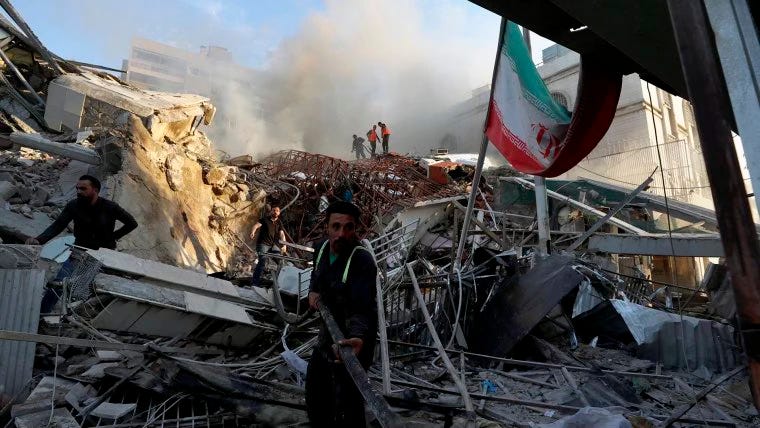
On Monday, a dramatic episode unfolded as suspected Israeli warplanes executed a severe strike on Iran's embassy in Syria, located in Damascus's Mezzeh district. This audacious assault not only devastated part of the diplomatic enclave but also led to the death of seven Iranian military advisers, including three prominent commanders. Amidst the debris of a shattered building, emergency workers were seen frantically searching through the wreckage, with the Iranian flag sorrowfully hanging nearby, symbolizing the gravity of the incident. Syrian Foreign Minister Faisal Mekdad, present at the calamity's heart, vehemently condemned the act as a "heinous terrorist attack" that wrought the tragic demise of several innocents.
The bombardment specifically targeted a consular building within the embassy's perimeter, also impacting the ambassador’s residence. Iran grieved the loss of Mohammad Reza Zahedi, a high-ranking commander of the Quds Force, marking a significant intensification in Israel's longstanding adversarial stance against Iran and its regional allies. Israel's history of military actions aimed at curtailing Iran's strategic presence in Syria set the stage for this unprecedented assault directly on Iranian diplomatic soil.
This incident escalates the already volatile tensions, with Israel stepping up its operations against Iran's Revolutionary Guard and Hezbollah, thereby heightening regional discord. Israel’s usual silence on such operations stood in contrast to the global outcry it sparked. The Iranian U.N. mission decried the strike as a "blatant violation of international law," and the ensuing diplomatic turmoil saw a chorus of disapproval from several Muslim nations and Russia.
To better understand this event's significance, it's essential to recognize the entrenched conflict narrative where Israel perceives these military interventions as necessary to counteract Iranian influence and prevent its encroachment in the region. The international community watches anxiously, contemplating the possible escalation this bold military action might trigger. With analysts divided over the attack's long-term consequences, the region stands at a critical juncture, with the potential for increased hostilities or a recalibration of diplomatic engagements.



